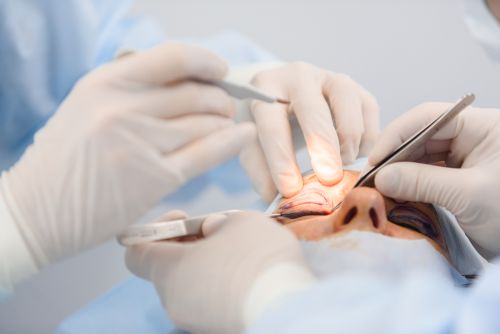Mike Saul
PartnerView Profile
* Indicates a required field
Are you contemplating blepharoplasty (eyelid surgery)? It's a procedure that many people choose to improve the appearance of their eyelids or to fix some medical issues. While you may be keen to see the end results, it's equally important to understand what happens after the surgery.
In this blog post, Cosmetic Surgery Solicitors walk you through what you can typically expect during the recovery period. We'll talk about how long it usually takes to recover, and the kind of complications you should be aware of.
Blepharoplasty, or what most of us simply call eyelid surgery, is a procedure where a surgeon works on your eyelids to give them a fresher look, or to sort out any issues you might have. Some people get it done because they have saggy or droopy eyelids that make them look older or tired. Others might need it to correct a medical issue, like a drooping eyelid that's affecting their vision. Whatever the reason, the surgery generally aims to help you look better or see better by making changes to your eyelids.

Right after your eyelid surgery, you might feel a bit groggy or confused, especially if you had general anaesthesia. You'll probably spend a few hours at the hospital or clinic so the medical staff can make sure you're OK before letting you go home. They will give you some instructions for initial aftercare, like how to clean the area and what sort of eye drops or ointments to use.
In the first week after your surgery, you'll likely experience some swelling and bruising around your eyes. Things might look a bit darker or puffier than usual; don't worry, that's normal. You may also find that your eyes are more sensitive to light during this time. If you have had stitches, they are often removed after about a week. It's a good idea to avoid heavy exercise and keep your head elevated as much as possible to help with the swelling.
As you move into the second week, you'll start to notice the swelling and bruising getting better. You'll begin to see the changes more clearly as your eyes start to heal. By this point, most people feel comfortable enough to get back to their normal activities, although you should still avoid things like heavy lifting.
Expect to wait about a month or so to see the final results, and for all the swelling and other symptoms to fully disappear. At this point, you should be able to enjoy the new look or improved function of your eyelids.
Remember, everyone's body heals at its own pace, so your recovery might be a bit quicker or slower than what's generally expected. Always follow the advice from your healthcare provider for the best results.
After your eyelid surgery, it's normal to experience some mild pain, itching, or a bit of a gritty feeling in your eyes. You might also have temporary blurred vision. These are common side effects and usually not a big worry. Just make sure you follow your doctor's advice on how to manage them.
While most people go through the recovery process without any major issues, there are some more serious issues that you should be aware of. These can include infection, excessive bleeding, or even problems with your vision. If you notice anything unusual like extreme pain, lots of discharge, or sudden vision loss, get in touch with your healthcare provider straight away.
To cut down the risk of running into complications, make sure you listen carefully to your healthcare provider's instructions both before and after the surgery. This can include things like stopping certain medications before your surgery or taking specific antibiotics afterward to prevent infection.
It's really important to be aware of any signs of trouble and to contact your healthcare provider if you're worried. Doing so can make your recovery process much smoother and help you avoid any serious problems.
Remember, being well-informed and following medical advice closely are your best bets for a successful recovery.
Taking good care of yourself after eyelid surgery can be key to a smooth and quick recovery. Here are some straightforward tips on how to look after the operated area.
Your healthcare provider will likely give you special eye drops or ointments to keep the area clean. Make sure you use them as directed to prevent infection.
It's a good idea to sleep with your head elevated for the first few days after surgery. This can help reduce swelling and make you more comfortable.
You might be given some medication to control pain or to prevent infection. Take them as prescribed and never skip doses.
For the first couple of weeks, try to avoid activities that could strain your eyes or increase blood flow to your head, like bending down, lifting heavy objects, or strenuous exercise. You should also avoid rubbing your eyes.
Your eyes will be more sensitive to light and UV rays, so wear sunglasses when you go outside and avoid direct sunlight on your face. Some doctors even recommend applying suncream to the scar area (once it’s sufficiently healed) to avoid darkening.
Make sure you go to all your follow-up appointments so your healthcare provider can monitor your recovery and address any concerns you might have.
By following these simple tips and sticking to the advice from your healthcare provider, you're setting yourself up for a more comfortable and successful recovery.
If you have experienced problems following eyelid surgery and think they are the result of negligence, talk to our expert cosmetic surgery negligence team today. Call 0808 189 7720 or request a call back by completing the contact form.
Contact our team today by calling 0808 256 7148 or using our online contact form.
Whether you have questions about negligent cosmetic surgery or need assistance with your case, reach out to us today.